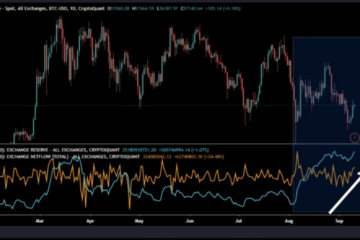Bitwise Chief Information Officer (CIO) Matt Hougan recently shared five interesting predictions for the next Halving of the Bitcoin (BTC) network, scheduled for 2028. In a comprehensive report, Hougan sheds light on the potential transformations for the world’s leading cryptocurrency.
New Investors And ETFs As Catalysts
One of Hougan’s key predictions is that Bitcoin’s volatility will significantly decline by 50%. He argues that the entry of new investors through the spot Bitcoin exchange-traded fund (ETF) market will drive this decline.
Hougan said that as financial advisors, family offices, and institutions enter the Bitcoin market, their different investment behaviors – such as portfolio rebalancing and steady drip investments – could introduce counter-cyclical flows, ultimately dampening Bitcoin’s volatility.
Hougan’s second prediction revolves around the allocation of Bitcoin in portfolios. He believes that 5% allocations to Bitcoin will become commonplace in target-date portfolios. As BTC’s volatility decreases and becomes more attractive to institutional investors, Hougan expects a rise in typical portfolio allocations.
The Bitwise CIO predicts that Bitcoin ETFs will attract over $200 billion in inflows. He highlights their impressive growth and cites their status as the fastest-growing new ETF category of all time.
Hougan suggests that the ETF market is still in its early stages, with national wirehouses and institutions just beginning their due diligence. Drawing parallels with the rise of gold ETFs, which experienced year-after-year growth in net flows, he anticipates a similar trend for Bitcoin ETFs.
Bitcoin Price Path Toward $250,000
In an intriguing projection, Hougan suggests that central banks will allocate funds to Bitcoin before the next Halving event. He notes that central banks have historically been significant investors in gold, accumulating substantial amounts of the metal.
However, with Bitcoin’s characteristics as non-debt money and its functional advantages over gold regarding payments and settlement, Hougan believes central banks will be increasingly drawn to Bitcoin. Hougan further noted on this matter:
There is also an element of game theory here. A major central bank adopting Bitcoin as a reserve asset would be a game-changer for Bitcoin and, I believe, would contribute to a dramatic increase in prices. Will one central bank try to front-run the others?
Hougan’s final prediction revolves around Bitcoin’s price. He forecasts that Bitcoin will trade above $250,000 by 2028, an increase of nearly 280% from current levels.
The Bitwise CIO attributes Bitcoin’s previous exponential growth to its transition from a speculative asset to one with real-world utility.
Factors such as declining volatility, improved custody options, low correlations to traditional stocks, enhanced accessibility through ETFs, and growing institutional adoption all contribute to Hougan’s optimism regarding Bitcoin’s future progress. Hougan concluded by stating:
With the ETFs launched and gathering assets—and major Wall Street firms lining up behind bitcoin—I suspect the asset will continue to move further into the mainstream. At $250,000, bitcoin would be a $5 trillion asset. Could it go higher? Of course. But $250,000 would represent solid progress between halvings, and I think we’ll see at least that.
Currently trading at $64,500, BTC is down nearly 3% in the past 24 hours after retesting the $67,000 mark on Tuesday and failing to consolidate above that level.
Featured image from Shutterstock, chart from TradingView.com
Disclaimer: The article is provided for educational purposes only. It does not represent the opinions of NewsBTC on whether to buy, sell or hold any investments and naturally investing carries risks. You are advised to conduct your own research before making any investment decisions. Use information provided on this website entirely at your own risk.
 Bitcoin
Bitcoin  Ethereum
Ethereum  Tether
Tether  XRP
XRP  USDC
USDC  JUSD
JUSD  Lido Staked Ether
Lido Staked Ether  TRON
TRON  Dogecoin
Dogecoin  Figure Heloc
Figure Heloc  Cardano
Cardano  Wrapped stETH
Wrapped stETH  Bitcoin Cash
Bitcoin Cash  WhiteBIT Coin
WhiteBIT Coin  Wrapped Bitcoin
Wrapped Bitcoin  Wrapped eETH
Wrapped eETH  USDS
USDS  Binance Bridged USDT (BNB Smart Chain)
Binance Bridged USDT (BNB Smart Chain)  Monero
Monero  Chainlink
Chainlink  LEO Token
LEO Token  Hyperliquid
Hyperliquid  Coinbase Wrapped BTC
Coinbase Wrapped BTC  WETH
WETH  Stellar
Stellar  Ethena USDe
Ethena USDe  Canton
Canton  Zcash
Zcash  Sui
Sui  Litecoin
Litecoin  Avalanche
Avalanche  USD1
USD1  Hedera
Hedera  Shiba Inu
Shiba Inu  World Liberty Financial
World Liberty Financial  USDT0
USDT0  Dai
Dai  sUSDS
sUSDS  PayPal USD
PayPal USD  Ethena Staked USDe
Ethena Staked USDe  Toncoin
Toncoin  Cronos
Cronos  Rain
Rain  Polkadot
Polkadot  Uniswap
Uniswap  Mantle
Mantle  Tether Gold
Tether Gold  MemeCore
MemeCore 


